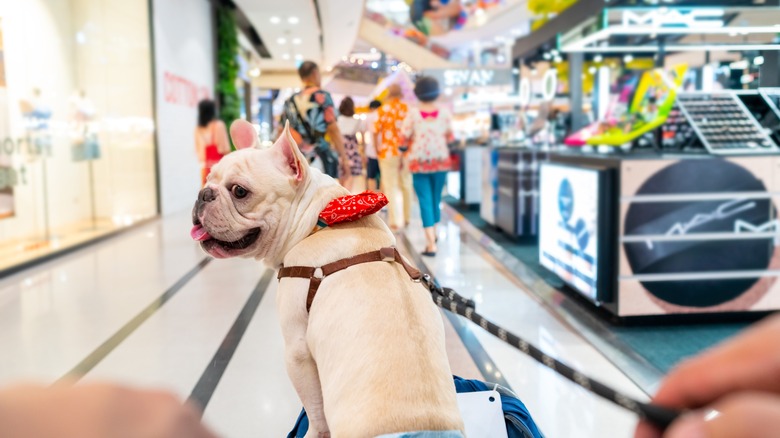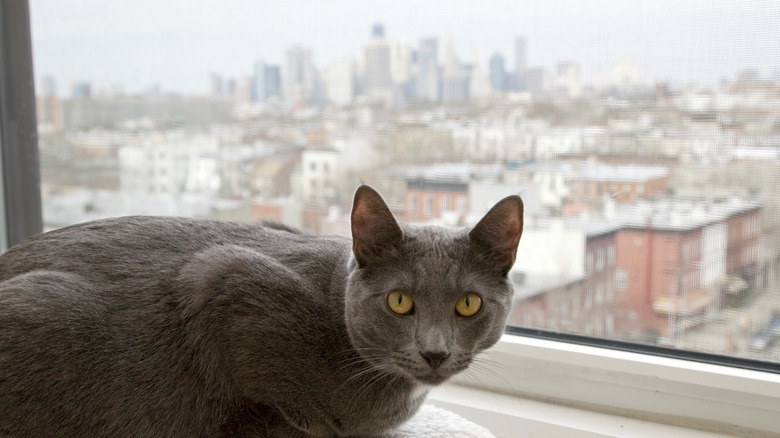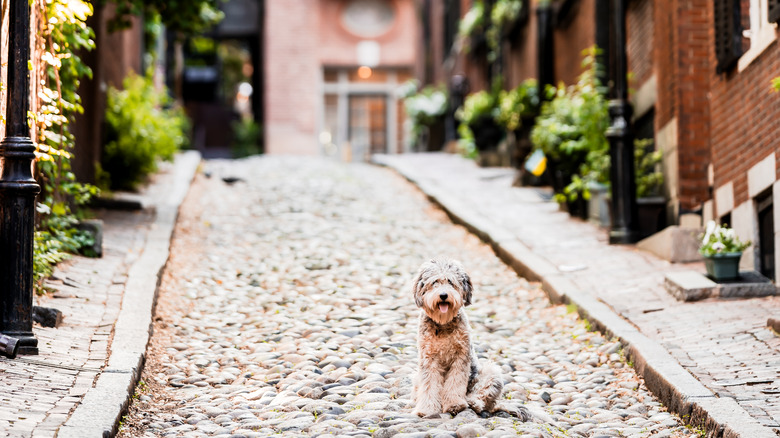The Most Expensive U.S. Cities To Have A Pet
Few households in the U.S. remain unaffected by the rising cost of living. Further exasperating matters is the financial reality of owning a pet: For all its joys, it can be a downright costly responsibility. The financial strain is particularly evident among younger generations. In 2024, Newsweek reported on a study that showed 25% of Gen Z pet parents in the U.S. have been forced to surrender their pets due to affordability issues. With rising inflation affecting 85% of pet parents, many are reconsidering ownership altogether, making any locale a challenging place to afford a furry companion, much less an expensive city.
The expenses can grow significantly in cities where the cost of living is already high. Urban centers notorious for their steep housing prices and day-to-day living expenses see this mirrored in the cost of pet parenting. Whether it's the price of veterinary care, pet insurance, food, or even grooming, cities like San Francisco and New York regularly top the charts for pet-related expenditures.
San Francisco
San Francisco is likely the most expensive West Coast city for pet parents, reflecting the broader trend of high living costs across the state of California. In the City by the Bay, veterinary care in particular isa significant financial burden. According to a 2021 estimate by the platform Wag!, on average, dog parents in the city can expect to spend around $3,872 annually. This figure doesn't factor in the intervening rise in costs and ongoing vet clinic crisis sparked by increased pet ownership following the COVID-19 pandemic.
The cost of pet insurance for dogs and cats adds to this, with yearly premiums that can run as high as $1,350 per pet, while the national average hovers around $720 annually. Like the city's hills, basic costs such as food, daycare, grooming, and dog park membership, run steep, averaging around $2,000 annually per dog (with cats half as expensive). That figure can more than double depending on the types of services a pet owner needs, such as dog walking. Beyond core expenses and a strained pet care infrastructure, San Francisco's tight housing market makes it difficult for renters with pets. Landlords often charge additional pet fees, exacerbating the financial strain. The city's high cost of living extends beyond housing and healthcare, making it an expensive place for anyone — especially pet lovers.
Sadly, pet-related services in California are strained across the board. Per Spectrum News, an estimated 5 to 10% of California's unhoused population own pets. In 2022–2023, San Francisco Animal Care and Control shelters took in 6,611 homeless pets, while Los Angeles County shelters received a significantly higher total of 31,591 homeless animals.
New York City
New York City (NYC) remains one of the most expensive places to own a pet, with soaring costs driven by the high cost of living and increasing demand for premium pet services. Despite this reality, around half of the city's households call at least one pet family. That said, New Yorkers are known to spoil their pets, with Forbes Advisor reporting in 2024 that some spend more on dog grooming than their own personal care. Those expenses certainly add up. Per Wag!, the annual cost of owning a dog in NYC runs anywhere between $1,751 and $5,000.
On top of the general increase in medical and food expenses, those working a 9 to 5 in the Big Apple will likely incur dog walking costs that can run up to around $7,000 annually, adding to the financial burden. Additionally, housing constraints in the city — along with many landlords charging high pet fees or restricting pet ownership altogether — exacerbate these costs. Some NYC rental fees for pets may run into the $1,000 per month range.
Boston
As of 2024, Massachusetts ranked as the second most expensive state in the nation for overall cost of living, per Forbes Advisor. Thus, it makes sense the state's marquee metropolis of Boston is one of the country's most expensive cities to be a pet parent. A 2023 study by Pettable pegged the average cost of pet ownership in the state as whole at just under $3,000. Beantown's veterinary bills average $679 per year, pet insurance $601, and food costs add up to $757.
As it does in other major cities, high costs contribute to housing challenges for pet owners in Boston, where fees and restrictions often make pet-friendly (especially dog-friendly) rental housing scarce. Overcrowded animal shelters underscore the issue, as some residents struggle to afford the rising expenses of pet ownership.
In response, the Massachusetts Society for the Prevention of Cruelty to Animals (MSPCA) offers reduced adoption fees and supports legislation to ease adoption restrictions, hoping to ensure every dog has a loving home, regardless of financial constraints. But this doesn't mean that you shouldn't first thoroughly assess the entire picture to avoid making key mistakes when you adopt a pet.
Jersey City
While Jersey City doesn't top the list of the most expensive cities for pet ownership, being situated just across the Hudson River from Manhattan, it still presents significant costs. The Garden State itself is considered one of the most expensive states for pet ownership, just behind Massachusetts. In 2021, the state's annual average recurring pet expenses stood at $2,500. Translated into 2024 dollars, that figure is approximately $3,000. These figures, though lower than in cities like San Francisco and New York, reflect the broader high cost of living in New Jersey.
In addition to healthcare, other pet-related expenses contribute to the financial burden. In fact, pet insurance companies have recently drawn the ire of New Jersey Congressman Josh Gottheimer for their rate hike proposals of up to 56% from current levels.Although Jersey City is slightly less expensive for pet ownership than major cities like NYC, the combination of high living expenses and service fees still makes it a costly endeavor.
Honolulu
Pet parenting in paradisiacal Honolulu is rewarding but costly, driven by factors like high living expenses and limited veterinary options. Annual pet health care costs average between $1,000 and $1,500 and up, while pet insurance (costing roughly $700 per year) only partially offsets these expenses. Food costs alone can total $800 annually, reflecting Hawaii's high import fees. Grooming is another expense, with sessions ranging from $50 to $100 each, per animal.
The financial challenges extend to housing, where renters often face pet fees and breed restrictions in a competitive market. The city's limited pet-friendly spaces, including few off-leash parks and beaches, add to the hurdles. Despite its natural beauty, Hawaii is burdened by its reputation as one of the least pet-friendly states.
However, initiatives are emerging to support pet parents in need. The Foundation for Animal Care and Education (FACE) is a nonprofit organization that provides financial relief for emergency pet care. As reported by local news outlet KHON2 in 2023, FACE contributed $25,000 to aid Maui pet owners affected by wildfires, emphasizing the critical support available for unexpected medical costs. While Honolulu remains an expensive place to be a responsible pet parent, organizations like FACE are making it possible for more residents to afford the essentials for their beloved fur babies.





